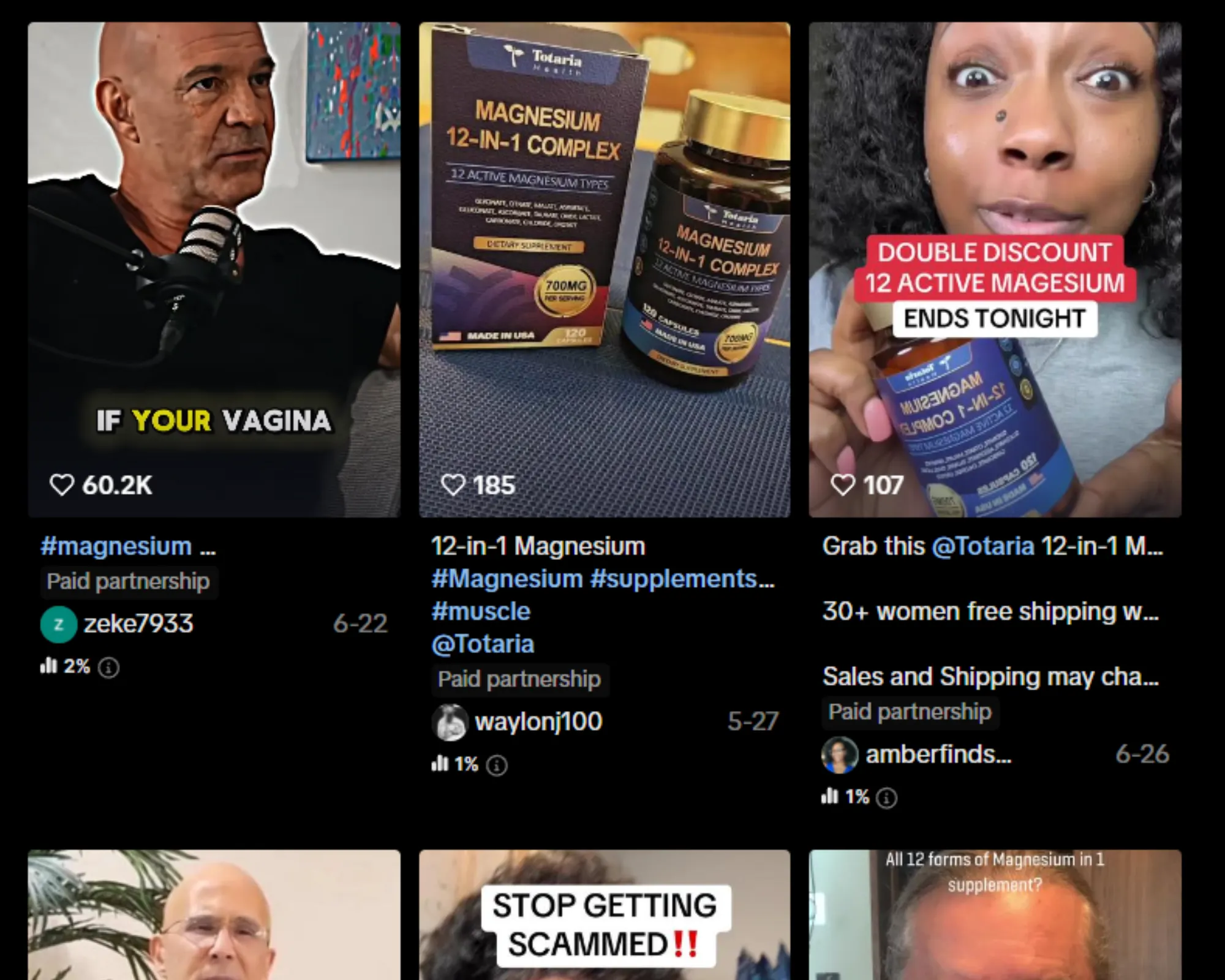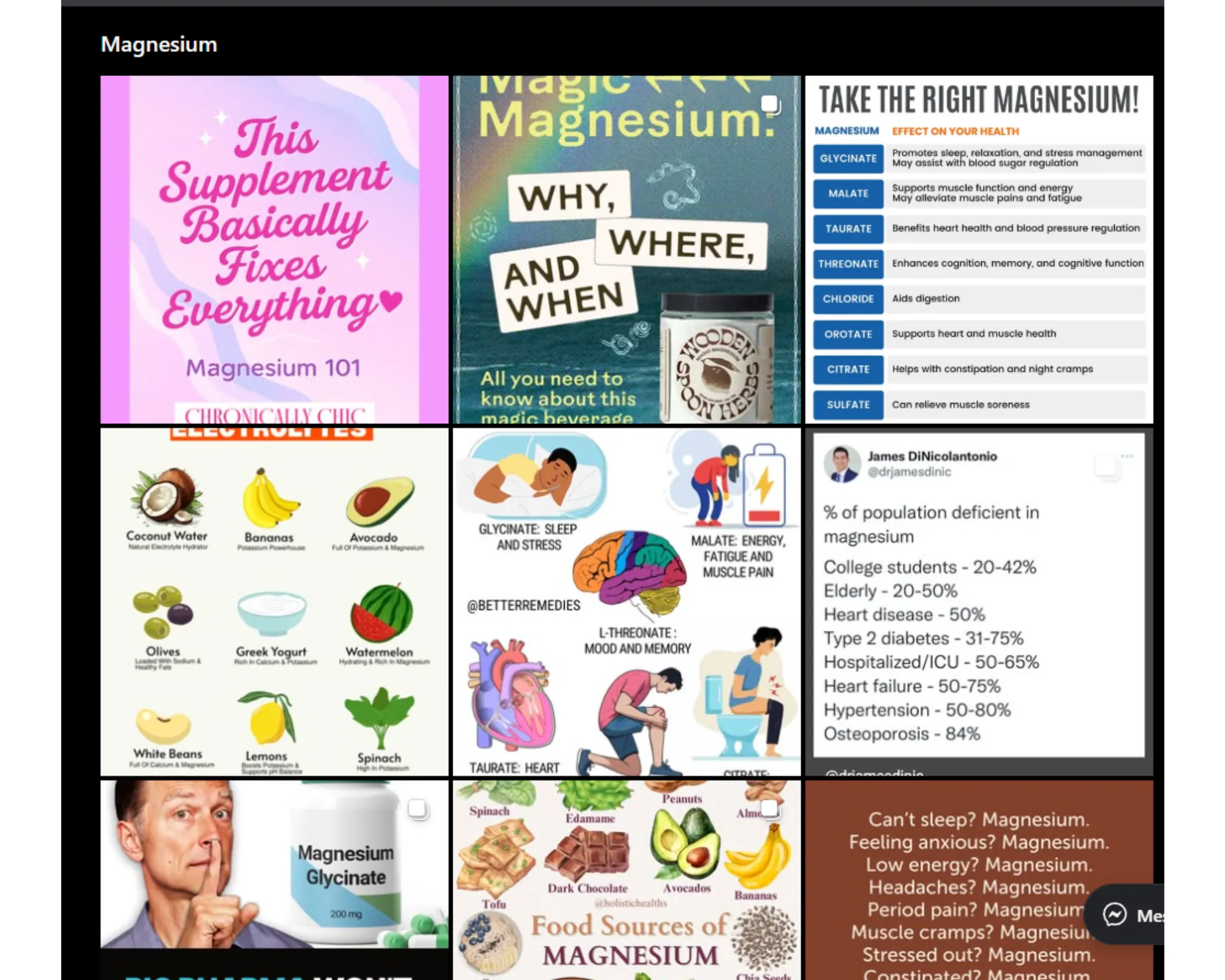Magnesium: Miracle mineral or marketing ploy? Your feed is likely flooded with promises of blissful sleep, zen-like calm, and maybe even immortality, all thanks to this trending supplement. Wellness gurus (and their eerily perfect AI doppelgangers) are singing its praises. But before you load up on magnesium, a dose of reality: Experts warn the hype is dangerously overblown. Is this mineral a game-changer, or just another fleeting fad fueled by misinformation?
TikTok’s awash in miracle magnesium. Human influencers and AI avatars alike hawk these supplements as cure-alls for everything from anxiety to sleepless nights to stubborn weight. But hold on: some doses pack a whopping 700mg – almost double the safe limit. Doctors are sounding the alarm. Is this health hack heaven or a recipe for disaster?
“Imagine receiving medical advice with absolute certainty: ‘If you have this symptom, here’s the definitive solution.’ That’s the allure of AI ‘physicians,’ delivering seemingly foolproof testimonials,” warns Dr. Steven Chen of USC School of Pharmacy, speaking toDecrypt. “But beneath that convincing facade lies a critical danger: these AI snippets conveniently omit the potential risks, leaving patients vulnerable.”
Chen cautioned that while magnesium boasts genuine benefits think smoother digestion and soothed muscles these perks are being selectively highlighted and inflated beyond reality.
As AI-generated images become more advanced, experts say the line between fact and fiction is becoming harder to spot.
Forget miracle pills and fleeting trends. Magnesium, the unsung hero of wellness, is as close as your pantry. Most adults thrive on a mere 400mg daily, easily sourced from peanut butter, cashews, chia seeds, chicken breast, and salmon. Yet, viral supplements peddle themselves as quick fixes, cramming twice the necessary dose into a single pill. Are you optimizing your health, or just following the algorithm?
Magnesium: Not a controlled substance, but its marketing? A wild west. Fueled by algorithmic hype and AI-fabricated endorsements, it’s morphed into a health product cash cow, practically unregulated and ripe for exploitation.

Image: Magnesium ads on TikTok
Too much magnesium can be especially harmful, especially for people with heart, digestive, or kidney problems.
Magnesium: Miracle Mineral or Gut-Wrenching Gamble? While this essential nutrient powers everything from muscle function to mood, popping those supplements isn’t always a smooth ride. Some experience unpleasant pit stops: diarrhea’s dash for the toilet, nausea’s queasy waves, stomach cramps that knot you up, a flush hotter than a summer day, headaches that pound, and muscles that suddenly forget how to lift.
But for those with kidney woes, the stakes get much higher. When your kidneys can’t filter the excess, magnesium builds up, turning from helpful hero to silent saboteur. Blood pressure plummets, urination becomes a struggle, confusion clouds the mind, breaths come short and shallow, your heart stutters with an erratic rhythm, and, in the most dire cases, cardiac arrest strikes without warning. So, before you jump on the magnesium bandwagon, weigh the risks and consult a professional. Your body will thank you.
Imagine scrolling through your feed and seeing a trusted doctor recommending magnesium supplements. Sounds legit, right? Think again. A growing number of advertisers are weaponizing AI, creating fake endorsements from fabricated medical “experts.” According to Chen, this deceptive tactic isn’t just misleading; it’s “dangerous and unethical,” blurring the lines between genuine health advice and profit-driven propaganda.
“We’re all wired for instant gratification,” he admitted, “but chasing a miracle cure for true health is a fool’s errand. Real wellness – restorative sleep, invigorating movement, and nourishing food – demands a commitment, not a quick fix.”

Image: Magnesium ads on Instagram
Chasing eternal youth? You’re not alone. The promise of a pill that adds years to your life has sparked a supplement frenzy. In 2024, this quest fueled a staggering $189 billion dietary supplement market. Buckle up, because Precedence Research predicts this anti-aging gold rush will explode to $402 billion by 2035. Is it hope in a bottle, or just clever marketing?
Facing scrutiny over AI-generated medical endorsements and dubious health promises, social media giants offered vague policy defenses. A YouTube representative vaguely gestured towards their “medical misinformation guidelines,” a set of rules seemingly designed to be ignored, considering they prohibit content that flies in the face of established medical wisdom, like pushing dangerous alternative therapies or dissuading people from seeking proper medical attention.
Meta’s lips are sealed regarding the specific ads, but a spokesperson directed attention to the company’s advertising guidelines. These policies explicitly ban deceptive health claims, the promotion of dangerous supplements, and wildly inflated promises of health benefits. Also forbidden are ads preying on self-doubt or those that improperly use the images of medical professionals.
TikTok did not respond toDecrypt’srequest for comment.
“Social media promises a megaphone for every voice, a soapbox for every opinion. But what happens when those voices whisper dangerous advice? We champion free speech, yet must ask: At what cost? Are we willing to gamble with lives on the altar of unfiltered expression? Platforms must draw a line, ensuring the pursuit of viral trends doesn’t overshadow the vital need for timely, professional medical care. Delay can be deadly; a fleeting TikTok trend shouldn’t become a life sentence.”
Forget counting sheep! Magnesium, often touted for sleep and muscle ease, actually boasts a more intriguing backstory. Dr. Zhaoping Li, head of UCLA’s Human Nutrition Center, reveals its popularity stems from a surprising, targeted medical origin.
Li explained toDecryptthat the drug, initially intended to ease uterine contractions in preeclamptic women and stave off premature delivery, soon found a secondary purpose: muscle relaxation. Though rigorous research is scarce, whispers of its potential circulate, fueled by small studies hinting at relief for restless leg syndrome and a smoother path to pre-bedtime tranquility.
Magnesium deficiency: a silent thief robbing health, particularly from those with poor diets or chronic alcohol habits. That’s why, in hospitals and clinics, a magnesium boost is often part of the standard care.
“Think of it this way: When you’re rushed to the ER, doctors often administer vital nutrients, magnesium among them,” she explained. “That’s part of why magnesium is now so freely touted for a range of benefits. But therealmagic depends onwhyyou’re taking it in the first place.”
Chen and Li agree: While some magnesium forms boast superior absorption and targeted benefits, “complexes” flaunting a laundry list of types are often more marketing hype than health boost.
“Ditch the pills! For widespread wellness, load up on magnesium-rich natural foods,” advises Li. “The payoff is far greater than any handful of supplements.”
Li argues that the real promise of AI in health lies not in marketing supplements, but in understanding food.
“To truly harness AI’s power for health, we must embrace the symphony of food, not just isolate a single note in a capsule.”
Thanks for reading AI Avatars Are Pushing Mega-Dose Magnesium—Doctors Say It’s a Health Risk
